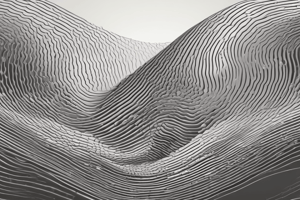Podcast
Questions and Answers
Match the following phenomena with the correct description:
Match the following phenomena with the correct description:
Reflection of sound = Sound bouncing back from a hard surface Refraction of sound = Change in direction of sound wave due to change in medium Diffraction of sound = Bending of sound waves around a obstacle Interference of sound = Superposition of two or more sound waves
Match the following terms with the correct definition:
Match the following terms with the correct definition:
Echo = Sound bouncing back from a hard surface Speed of sound = Distance traveled by a sound wave per unit time Diffraction = Change in direction of sound wave due to change in medium Interference = Combination of two or more sound waves
Match the following mediums with the speed of sound:
Match the following mediums with the speed of sound:
Solids = Faster Liquids = Slower than in solids Gases = Slowest Air at sea level = Given by a specific formula
Match the following descriptions with the correct concept:
Match the following descriptions with the correct concept:
Match the following phenomena with the correct characteristic:
Match the following phenomena with the correct characteristic:
Match the following statements with the correct concept:
Match the following statements with the correct concept:
Match the following terms with the correct phenomenon:
Match the following terms with the correct phenomenon:
Match the following descriptions with the correct concept:
Match the following descriptions with the correct concept:
Match the following phenomena with the correct result:
Match the following phenomena with the correct result:
Match the following terms with the correct definition:
Match the following terms with the correct definition:
Study Notes
Refraction of Sound
- Sound waves bend (change direction) when traveling through air with uneven temperature.
- Refraction occurs when the wave fronts travel at different speeds.
- Bending or change in the direction of a sound wave due to a change in its speed is called refraction.
Diffraction of Sound
- Diffraction of sound is the change in the direction or spreading out of a sound wave as it passes through an opening or around a barrier in its path.
- Example: hearing others speaking from adjacent rooms.
Superposition of Waves
- Superposition principle: when two or more waves pass through a single point at the same time, the resultant instantaneous displacement at that point is the sum of the displacements created separately by each wave, taking signs into account.
- Superposition produces a combination of constructive and destructive interference, varying from place to place and time to time.
Interference
- Constructive interference: when two waves are in phase, combining to make a bigger wave with twice the amplitude.
- Destructive interference: when two waves are out of phase, canceling each other, resulting in no wave.
Propagation of Waves and Energy Transmission
- Mechanical waves: waves that disturb and propagate through a medium, requiring a source of disturbance, a medium, and a physical mechanism for elements to influence each other.
- Examples of mechanical waves: sound waves, water waves, waves in strings.
- Longitudinal wave: oscillations are perpendicular to the direction of wave motion.
- Transverse wave: oscillations are parallel to the direction of wave motion.
Speed of Sound
- Speed of sound waves depends on the compressibility and density of the medium.
- Relationship between temperature and speed of sound in a medium: speed of sound increases with temperature.
- Speed of sound in air at sea level: can be determined by measuring the time it takes for a sound wave to travel a known distance.
Types of Waves
- Mechanical wave: waves that disturb and propagate through a medium.
- Electromagnetic wave: not mentioned in the text.
- Longitudinal wave: oscillations are perpendicular to the direction of wave motion.
- Transverse wave: oscillations are parallel to the direction of wave motion.
Reflection of Sound
- Reflection of sound: when sound waves bounce back from a hard surface, such as a wall or forest, and come towards the observer.
- Echo: the reflection of sound from hard surfaces.
Studying That Suits You
Use AI to generate personalized quizzes and flashcards to suit your learning preferences.
Description
Test your understanding of refraction and diffraction of sound waves, including how they change direction and speed when traveling through different mediums and around barriers. Learn about the concepts of refraction and diffraction, and how they affect sound waves.




